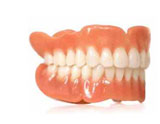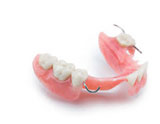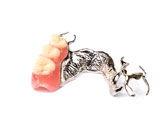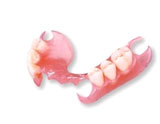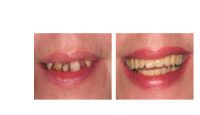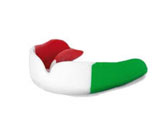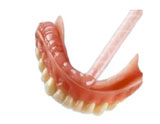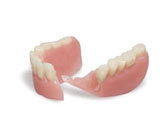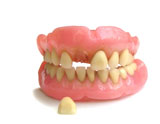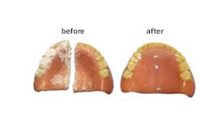Better Dentures Better Life
Better Dentures treats our patients with the utmost honesty and respect so that you can feel comfortable and safe knowing you are being looked after as part of the Better Dentures’ family. These strong values and our ongoing commitment are important to us as we strive to make a significant contribution and difference to the lives of our patients, one smile at a time.
Call for a Check-up in these situations
*Free Consultation*
Dentures procedure
Frequently asked Questions
Denture adhesive can be used to increase the feeling of security and give you peace of mind that your dentures will stay in place all day. Well-fitting dentures can benefit from this additional retention, but adhesive is not the solution for ill-fitting dentures. If your dentures feel loose or cause irritation and sores, it is advised that you consult your dentist for amendments.
Removing your dentures at night gives your gums, bones, and other denture bearing tissues a chance to relax and recover. If you do want to wear your dentures at night, it’s important to properly clean your dentures during the day. This prevents any irritation, odour or disease that can stem from poor oral hygiene management.
Within the first couple of weeks of receiving your dentures, you will be advised to wear them almost constantly, even when you sleep. After this initial period, it is advised that you remove your dentures at night while you sleep to allow the gum tissue to rest and encourage normal stimulation and cleansing by the tongue and saliva.
While chewing gum can increase saliva production, it is best to avoid chewing gum where possible. Chewing gum typically pulls at your dentures and may loosen the seal. This could result in your dentures becoming loose at inconvenient times. Chewing gum also sticks to the acrylic plastic in dentures and can remain stuck. Stuck gum will eventually harden and discolour.
As your tongue and mouth get used to your new dentures, eating may take some practice at first. It is advised that you begin with softer foods cut into small pieces, and ensure you chew with both sides of your dentures at the same time to avoid any movement of your dentures. Eventually, you will feel comfortable returning to your normal diet without a second thought, but it is important to remain cautious with hot or hard foods and sharp bones or shells.
What Can I Eat After Getting Dentures?
When you first have your dentures, you may prefer to start with softer foods cut into small pieces. This can include foods like applesauce, pudding, mashed potatoes and yoghurt.
If cared for properly, dentures are expected to last up to 5-8 years before needing replacement. During this time, they wear out and your mouth changes shape. This is why your dentures will eventually need to be relined or remade to remain as safe, comfortable and natural looking as possible.
There are risks associated with any extraction. These risks include pain, inflammation, swelling, infection, and prolonged bleeding. There are issues with dentures such as plaque and denture odour. These risks can be managed with proper oral hygiene management.
There are several alternatives to dentures, including dental implants and tooth supported fixed bridges. Dental implants are becoming a popular alternative to restoring teeth as they more closely resemble the feel of natural teeth. They are, however, more expensive than dentures, and they require a strong and healthy gum and jawbone for implantation, so not everyone is a candidate for this treatment.
Your smile.com.au approved dentist can assess your individual circumstances and recommend the best solution for you.
It may take a couple of weeks for you to get used to your dentures. During this time, your dentures may feel awkward and uncomfortable as you learn to speak and eat with them. Your mouth will become accustomed to your new dentures with time, and it is important to remember that although they may feel a bit strange at first, they still look great to everyone else!
Generally recommended that you return every six months for a check-up and professional cleaning to maintain good oral health so you can continue wearing your dentures with a smile.
It is important to be very careful with your dentures to avoid dropping and breaking them. You must also brush and rinse them daily with a special denture cleaner to remove any bacteria. The general rule of thumb is to brush, soak, and brush again. Brushing your dentures before soaking them helps to remove any food debris.
Effervescent denture cleaner will help to remove stubborn stains and leave your dentures feeling fresh and clean. Following this, you should then brush the dentures again, as you would your own teeth, being careful not to scrub too hard as this can leave marks.
Most dentists recommend using a small- to medium-headed toothbrush and toothpaste. Make sure you clean all the surfaces of the dentures including the surface that comes into contact with your gums. This is especially important if you use any kind of denture adhesive. If you notice a build-up of stains or scale, have your denture professionally cleaned by your Smile approved dentist.
Maintaining good oral hygiene is vital, even when wearing full dentures. You should brush your gums, the roof of your mouth and your tongue with a soft bristled toothbrush every day to keep your mouth clean and healthy and stimulate circulation in your mouth.
Patients with partial dentures need to brush their teeth thoroughly twice a day to prevent tooth decay and gum disease that can result in losing further teeth.
Dentures need to remain moist to retain their shape and not dry out. If dentures dry out, they can warp or crack. You can soak your dentures overnight in water or in a water-based cleanser. Do not soak your dentures in hot or boiling water as it may make your dentures warp.
Regular toothpaste is designed for real teeth and contains ingredients that are harmful to dentures. In some cases, bleach, vinegar and soap can also cause damage. To avoid any potential damaging, hand wash your dentures every night with dishwashing liquid and a brush. You can then soak your dentures overnight in a water-based cleaning solution.
When used correctly, denture adhesives are perfectly safe. It is only when used excessively for ill-fitting dentures that adhesives can cause harm to underlying gums and tissues of the mouth.
If you need dentures, you will probably have experienced significant tooth loss and be missing most or all of your teeth. A partial denture is suitable for those who still have some natural teeth remaining. There are several factors that warrant wearing dentures, even for younger people, such as gum disease, tooth decay, or dental abnormalities such as ectodermal dysplasia. There is no age limit on having a beautiful, healthy smile!
Immediate dentures can be manufactured and inserted the same day your remaining teeth are extracted. Immediate dentures can be worn while you are healing from your extractions. Conventional dentures however typically take between two to three weeks to produce. Conventional dentures are also inserted after the gums have healed from any extractions and this can take several weeks.
Some health or dental insurance providers will assist with the cost of dentures, whereas others may not, as the treatment can be considered cosmetic dentistry. smile.com.au members who choose to have health insurance can benefit twice over. Simply receive your smile.com.au member savings at your appointment and claim your rebate from your health insurance afterwards. Read more about using smile.com.au dental cover together with your private health insurance here.
It is normal to experience a small amount of irritation but this disappears as your mouth becomes adjusted to your dentures. You may experience pain and discomfort where you have had teeth extracted, however, the severity of pain varies. As dentures are tailored to your personal specifications, you can have your dentures adjusted through the normal healing process to guarantee a comfortable fit.

